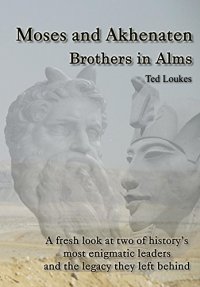Two of the ancient world’s most enigmatic characters, Moses, who led the Israelites from bondage in Egypt to the Promised Land, yet archaeologically didn’t exist, and the heretical Pharaoh who overturned the religion of Egypt and was deliberately erased from history. Who were these two men and what was the legacy they left behind? It was Sigmund Freud who first suggested that Moses was not a Hebrew, but was, in fact, of Egyptian noble stock and that he was a supporter of Akhenaten, or even Akhenaten himself. Freud claimed that Moses led his immediate followers out of Egypt during the instability that took over after Akhenaten died. The new religion that Moses established during the wanderings in the desert was actually his own interpretation of the Atenism that he had learned as a child in the Great House. What if Moses was indeed an Egyptian, a man of noble birth, a man certainly involved in the priesthood of the time? To understand Moses and Akhenaten we need to understand the times they lived in. We need to establish how Moses came to be raised in a royal household; where he went when he left Egypt; what happened when he returned; how the circumstances of the Exodus occurred and under which Egyptian king did it take place.
We must take a fresh look at whatever inscriptional evidence there is and re-evaluate the various texts that have survived. But before we do that, we need to understand why what we read in textbooks and encyclopaedias today, is not really ‘cast in stone’. Let us look at the evidence, or maybe we should say relook, as much of what we have been told has been distorted by time, mistranslation, and by misunderstanding. Much of the archaeology, and indeed many of the translations of ancient texts and inscriptions, was done by scholars from an age far removed from our own, with very different societal beliefs, moralities and values. It is time we looked at these texts and inscriptions with 21st Century eyes, and maybe we will draw different conclusions and uncover different stories to the ones still taught in our schools today.
Mulholland & The St. Francis Dam: Engineering Failure (Anatomy of Catastrophe Book 11)
Americana A Civics Handbook Second Edition
Reviews:
No reviews yet.
Third Party Reviews:
No reviews yet. Why not link one?
You can suggest a blog review here
<< Next post in Archived Books
Previous post in Archived Books >>
2015-09-25




